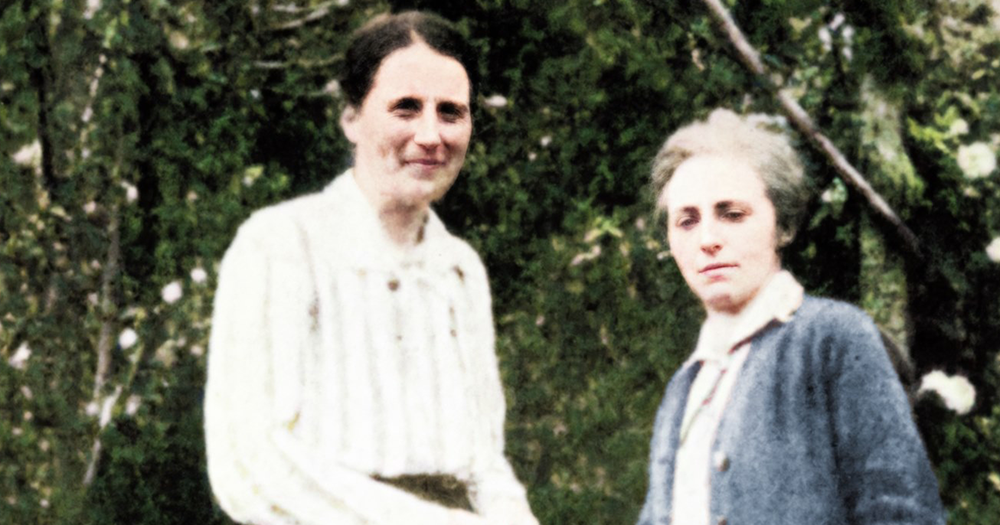The Easter Rising, which began on April 24, 1916, was arguably one of the most important events during the Irish Revolution. Often overlooked are the roughly 300 women that took part in the fight. Two of these revolutionaries were Dr Kathleen Lynn and her partner Madeleine ffrench-Mullen, a lesbian couple from Dublin arrested during the Easter Rising and who is credited with helping pave the way for the foundation of the Irish Free State in 1922.
Mary McAuliffe, Director of Gender Studies at UCD and National LGBT Federation (NXF) board member, discussed their legacy in a recent interview, and the information in this article comes thanks to her research.
Kathleen and Madeleine met in 1913 through the ‘Inghinidhe na hÉireann’ (the daughters of Ireland), a radical Irish nationalist women’s organisation founded by Maud Gonne that existed until 1914 when it merged with the ‘Cumann na mBan’ (The Irishwoman’s Council). Even though they were of the establishment class and lived comfortably, the women spent their days concerned for the well-being of those less fortunate than them. They were both committed Suffragettes, very anti-fascist and sympathised with the idea of communism.
United in their ideals and beliefs, the pair lived together in their home in Rathmines for thirty years until Madeleine’s death in 1944. Originally viewed by historians as friends, their relationship has recently been reevaluated through a queer lens.
During the Dublin lock-out of 1913, both women worked in the soup kitchen in Liberty Hall. Radical in their ideas and believing in the mission of James Connolly, the lesbian couple joined the Easter Rising – ffrench-Mullen as a lieutenant for the Irish-Citizen Army and Kathleen Lynn as its chief medical officer.
After the surrender on April 29, 1916, they were two of the 77 women that were imprisoned in Kilmainham Gaol for their fight. First sharing a cell, they eventually got moved to another prison where Kathleen notes in her diary that she “would give ten thousand pounds” to be with Madeleine. Eventually released from prison, they reunited and were able to continue their activism.
"During the Easter Rising of 1916, Madeleine ffrench-Mullen served as a lieutenant in the Irish Citizen Army" #EasterRising #WomenOf1916 pic.twitter.com/LRQ5Ns7oki
— Suryc tlec (@Emz420BI) April 14, 2017
Next to her political engagement Lynn, who Madeleine only calls “the doctor” in her diary entries, was one of the first female medical graduates from University College Dublin and the first female resident doctor in the Royal Victoria Eye and Ear Hospital.
Together with her partner and a group of female activists, she would go on to establish the female-run Saint Ultan’s Children’s Hospital, Ireland’s first hospital for infants, in 1919. It was also the first clinic in Ireland to offer the BCG vaccination, which is commonly used against Tuberculosis.
Despite objections from the state and the Roman Catholic Church, Lynn and ffrench-Mullen developed an initiative, and vaccinated hundreds of destitute children who would have otherwise, almost certainly died from the disease. Their accomplishment paved the way for the establishment of Ireland’s BCG program, which has immunised all infants since the 1950s.
Saint Ultan’s was also home to the first Montessori Unit in the country, for which the women brought in Maria Montessori, who set it up personally.
Aside from their activism, the two women enjoyed being outdoors and owned a holiday retreat in Glenmalure, near Glendalough in County Wicklow. As recorded in Kathleen’s diary, there they enjoyed “getting up very late and bathing in the river and then getting back into bed to warm up”.
Regarded as a team by their friends and described by Rosamund Jacob as women who had no “use at all for men”, the couple spent their time together “breakfasting in bed”, “celebrating ‘out ‘til dawn” and trying to make Ireland a better place.
Happy Easter Monday, everyone! ?
Read what Dr Kathleen Lynn had to say about the Easter Rising in 1916 and the days following the event through the link in our bio! pic.twitter.com/FjAaMJeFSM
— RCPI Heritage Centre (@RCPIArchive) April 10, 2023
Today, their role not only in the Easter rising but also as a lesbian couple slowly finds more recognition, one example being the plaque commemorating their impact on the building that used to be their hospital, which was unveiled last year.
© 2023 GCN (Gay Community News). All rights reserved.
Support GCN
GCN is a free, vital resource for Ireland’s LGBTQ+ community since 1988.
GCN is a trading name of National LGBT Federation CLG, a registered charity - Charity Number: 20034580.
GCN relies on the generous support of the community and allies to sustain the crucial work that we do. Producing GCN is costly, and, in an industry which has been hugely impacted by rising costs, we need your support to help sustain and grow this vital resource.
Supporting GCN for as little as €1.99 per month will help us continue our work as Ireland’s free, independent LGBTQ+ media.
